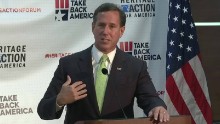GOP 2016 hopefuls split over Trump's Muslim controversy
Republican presidential hopefuls were split Friday amid the fallout from Donald Trump not taking issue with a man who, during a campaign event, called President Barack Obama a Muslim and said Muslims are "a problem in this country."
Rick Santorum and Ted Cruz refused to criticize Trump or say whether they believe Obama is a Christian, instead slamming reporters for asking about the incident. Jindal said it wasn't a candidate's "role" to correct a questioner -- but also said he would have pointed out the U.S.'s anti-discrimination values.
And Chris Christie, Lindsey Graham and Jeb Bush emphatically said they believe Obama was born in the U.S. and criticized Trump for not standing up to the questioner.
"Look, ladies and gentlemen I'm not playing this ... game that you want to play," a visibly aggravated Santorum said at Heritage Action's presidential forum in Greenville, South Carolina. "The President can defend himself. He doesn't need Rick Santorum to defend him. He's got you doing that very, very well. So cut it out."
RELATED: Trump doesn't challenge anti-Muslim questioner at event
Also speaking to reporters in Greenville, Cruz accused the press of trying to goad candidates into a "foodfight" and refused to say how he would have handled the same question about Muslims in American and Obama's faith.
Instead, Cruz accused the media of trying to "stir up controversy," repeatedly refusing to address the merits of the questioner's comments about Obama and Muslims in America or whether Trump should have handled the interaction differently.
"You know, my focus is on my campaign," Cruz said. "I understand the press wants to get Republicans throwing rocks at each other. How about we talk about the challenges facing this country?"
Santorum insisted he wouldn't correct an event attendee's questions or statements, even if they were controversial or offensive, a response that echoed his comments following a similar exchange with a supporter in 2012.
"The questioner can say whatever he wants. It's a free country. He's allowed to say whatever he wants," Santorum said. "But the idea that somehow ... we have to go out there and anytime someone says something that offends the press that we have to correct it. I think that's, that's part of the problem here."
Santorum continued to insist that "people are entitled to their opinions" when asked whether the assertion that Muslims are a "problem" in America might be offensive to the more than 2.5 million Muslims living in the United States.
Cruz has stood behind Trump more than any other candidate, backing the brash billionaire in the aftermath of one controversy after the next, even as many Republicans have asserted that Trump could alienate key voting blocs, such as Hispanics.
Santorum has also refused to slam Trump, most recently during Wednesday's Republican debate, when he stood out among the four contenders on stage for refusing to lob attacks at Trump, calling them a distraction.
Asked about the controversy in South Carolina, Jindal at first toed a similar line to Santorum's, saying that it's not his "role" to correct a questioner or determine Obama's true religion.
But pressed further, Jindal, who as of late has been Trump's fiercest critic in the GOP presidential field, said he would have handled the question differently.
"In America we proudly do not discriminate against anybody based on the color of their skin or creed, and that's a great thing about America -- and we shouldn't," he told CNN. "Those are our founding ideals and principles and they should always be that way."
Rather than the U.S. having a problem with Muslims, Jindal pivoted to his hardline stance on Islamic terrorism, saying that "Islam has a problem and that problem is radical Islam."
A recent CNN poll found that about four in 10 Republicans and 29% of Americans believe Obama is a Muslim.
Christie, Graham and Bush come to Obama's defense
Christie took a different tack early Friday morning when he called out Trump.
"If somebody at one of my town hall meetings said that, I would correct them and I would say, 'The President's a Christian and he was born in this country. Those two things are self-evident,'" the New Jersey governor told NBC's "Today" show on Friday. "I'll tell you what I would do, and I wouldn't have permitted that if someone brought that up at a town hall meeting of mine; I would have said, 'No, listen. Before we answer, let's clear some things up for the rest of the audience.' And I think you have an obligation as a leader to do that."
Christie added: "Donald Trump has to decide how serious a candidate he wants to be and how he handles different problems like this are going to determine that in the eyes of the American people. I'm not going to lecture him about what to do."
Lindsey Graham, speaking with MSNBC's Andrea Mitchell Friday, said Trump should have stood up to the questioner.
"I've had this happen to me in Iowa, where a guy used the 'N-word' and it was very derogatory towards President Obama and Muslims. And I said, 'I am not seeking your vote,'" Graham said. "President Obama, I don't question his faith. I don't question his patriotism. I don't question his origin of birth. And when these things happen, you are not responsible for what the guy said, but you are responsible for how you respond."
And Jeb Bush, speaking in Michigan Friday night, also said he believed Obama was a Christian and an American.
"By the way, he's an American, he's a Christian. His problem isn't that he was born here or what his religion is, his problem is that he tears down anyone that disagrees with him," Bush said.
After his speech, Bush was asked three times by a CNN reporter if he believes Trump should apologize for his comments.
"I spoke to that. I spoke to that," Bush said.
News Courtesy: www.cnn.com











